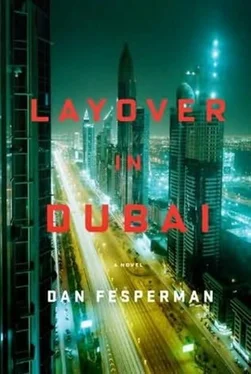He had followed the long stream of men in dust masks and helmets to their work site several blocks away, where he boarded a steel-cage elevator that clanked its way up the side of the skeletal building. The view, while disconcerting, was spectacular. Ocean and sky. Desert and golf courses. And everywhere, more construction in vast housing developments and sprawling business parks. Yellow cranes bloomed like flowers in the wake of a sudden rain.
Where were the millions of people who would live and work here? Sam had no idea, although signs along the approaching roadway still boasted of quick sales-SOLD OUT IN 6 HOURS! SOLD OUT IN 4 HOURS! SOLD OUT IN AN HOUR! or, his favorite, SOLD OUT AT PRE-LAUNCH! It was the giddiness of a pyramid scheme nearing its pinnacle. And up here, where you got a better feel for the scale, he sensed an unsteadiness at the base, a Jell-O quiver beneath the weight of high-yield expectations. Or maybe he was just trembling from his fear of heights.
He was sore, blistered, and sunburned from his first day of labor. Up on the thirty-first floor, any exposed skin was soon burned and chapped from sunlight and the gritty wind. His first job was carrying hods of concrete. But Sam couldn’t keep pace with his stronger and more experienced coworkers, so today the foreman had assigned him to operate a freight elevator to haul up blocks and mortar from a landing five stories below. Workers down there filled the platform, then Sam raised it to stops on the intervening floors.
Like everything else at the job site, the elevator’s diesel motor and cable pulley were jerry-rigged, braced by a framework of scaffolding. Sam had to look down the side of the building to make sure the platform stopped at the right levels, which meant he had to lean out into thin air. He crooked his left arm around the scaffolding for support while operating a lever with his right hand. Not the greatest feeling, but he soon got the hang of it, and was no longer convinced he was about to fall to his death. He even grew accustomed to the gusting desert wind, which made everything groan and wobble. Probably the very sort of blast that had killed Ramesh’s friend, Sanjay.
Fortunately, the elevator job kept Sam far removed from Ramesh. But Vikram had told him of new trouble on that front. Ramesh had apparently convinced other workers from his home village of Sam’s guilt in Sanjay’s demise. This clique was now referring to Sam as the white jambuka , or jackal, an animal that feasted on the dead. For today at least, the foreman had assigned Ramesh and his pals to jobs on lower levels.
It was soon time for lunch. There was a jug of water handy, so Sam decided to eat right there. Everyone else, Vikram included, took their food to ground level. Some of the men liked to walk out to the beach in hopes of spotting Western women in bikinis. It was another reason the photography store sold so many disposable cameras. In the barracks Sam had seen revealing snapshots taped to walls and pinned to overhead bunks-fantasy photos that allowed the men to imagine the pleasures of an Angelika from Düsseldorf, an Astrid from Stockholm.
He ate quickly, enjoying the solitude while the sweat cooled on his back. He now felt comfortable enough to swing his feet off the side of the ledge. Looking toward the coast, he saw the distant banners of the government development firms-Nakheel, Emaar, and Tameer-flag after flag snapping in the breeze. Nakheel’s were the last ones you saw before exiting into the Marina district. From his seat on the bus the company slogan had seemed like a taunt: NAKHEEL: WHERE VISION INSPIRES HUMANITY.
Turning east he saw the chockablock shimmer of Media City. He tried without success to pick out Laleh’s building. Thinking back on the day in her office, he realized what a privilege it had been to listen in on her comings and goings as a boss, a planner, a thinker. Even her parents didn’t have that kind of access to the young woman she had become, and Sam believed it had given him an edge, a secret knowledge that might help bridge the gap between their backgrounds. She had hinted as much herself, telling him with a complicit smile, “Don’t ever mention a word about all this to my father.” By “all this” it was clear she meant not just her workplace habits or manner of dress, but also her air of relative freedom in a world that was more like Sam’s than the one her parents knew.
He wondered if she had yet replied to his e-mail message from the night before. He had sent it by paying a few dirhams to use the Internet on the camera store’s desktop computer. The store’s dial-up modem was maddeningly slow, but it had also allowed him to do some further online sleuthing.
Two messages from Plevy had been waiting on his Gmail account.
“See first 2 attachments,” the first one said. “N has been quite the traveler. Also note third one. You have officially attained pariah status.”
Sam frowned and clicked his way through the items. The first was the most recent audit of Nanette Weaver. The second was a compilation of her three most recent quarterly reports. Few things leaped out except, as Plevy had hinted, her extensive travels-most notably several trips to Dubai plus another to her old diplomatic stomping grounds in Moscow. He filed away the dates for future reference.
One oddity was a commendation for a project she had worked on nearly a year ago with none other than Charlie Hatcher, although further details revealed it to be nothing more than an effort to streamline and secure shipping routes from the Far East.
Plevy’s third attachment was a company memo announcing that auditor Samuel Keller had gone AWOL in Dubai following “a criminal complaint alleging an attempted sexual assault on a coworker,” which it said was part of “a pattern of reckless personal conduct that may have led to the death of a valued associate, Charles Hatcher.”
Outrageous, but the fuse for an explosion refused to light. Too damp from weariness and despair. Sam was in exile in a prison of dust and sewage, stranded among thousands of overworked men of other nations and tongues.
“Shit!” he shouted, more in despair than in fury. His curse drew the attention of the Punjabi shopkeeper, who checked his watch and exclaimed, “Your time is run out! Ten more dirhams, or vacate the premises!”
Sam was about to sign off when he remembered he hadn’t opened Plevy’s second e-mail, which had arrived only a few hours later. It was a shock.
“What did you do, asshole? I’m suspended w/o pay, so fuck off! You better hope N finds you first.”
So much for a lifeline. It probably also meant Ansen’s password was no longer operable. He thought about trying it, but his instincts told him to lay low for now.
“Ten dirhams!” the shopkeeper shouted. “Ten dirhams or you must go now!”
It was then that Sam thought of Laleh, the only person he could still expect any sympathy from. So, he paid another ten dirhams from his precious supply, pulled out her business card for her e-mail address, and told her about his first day on the job. He kept the location vague, figuring that by now someone might be monitoring his Gmail account. He probably shouldn’t have sent the message at all, but he told himself he was doing it because Laleh was a more reliable link to Ali than Zafar. The real reason was that he felt better just typing her name. He imagined her reading the message in her bedroom, with the teen queen posters at one end and the all-business stuff at her desk. He smiled and clicked SEND. Then the owner chased him out of the shop.
Sam was finishing lunch when he heard the lurch of the personnel elevator. A bit surprising for anyone to be returning this soon. Glancing toward the ground, he saw that no blue helmets were yet streaming back to the building. Maybe Vikram had come to keep him company. He heard the door clank shut and looked over his shoulder to see Ramesh briskly moving toward him, fists clenched.
Читать дальше












